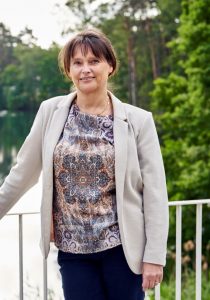Views from ...
All stakeholders need to work on bridging the workforce gap in nuclear
Dr Michèle Coeck, Director SCK CEN Academy for Nuclear Science and Technology, Co-chair of the FORATOM Education, Training & Knowledge Management Working Group
 From diagnostics and therapies in medicine, over sterilization techniques for agriculture and food production, to the generation of low-carbon electricity… nowadays a multitude of applications of ionizing radiation contributes to our overall wellbeing. All these ingenious technologies are also constantly optimized thanks to new research findings. In addition, there is a long tradition of striving for the highest levels of safety and reliability. Such developments could only be achieved thanks to an adequately educated and trained workforce in the nuclear industry, healthcare, research and governmental and supporting organizations.
From diagnostics and therapies in medicine, over sterilization techniques for agriculture and food production, to the generation of low-carbon electricity… nowadays a multitude of applications of ionizing radiation contributes to our overall wellbeing. All these ingenious technologies are also constantly optimized thanks to new research findings. In addition, there is a long tradition of striving for the highest levels of safety and reliability. Such developments could only be achieved thanks to an adequately educated and trained workforce in the nuclear industry, healthcare, research and governmental and supporting organizations.
Over the last few decades, there have been warnings concerning a shortage of competent nuclear personnel in all application contexts. Difficulties in retaining experienced staff and attracting new people into nuclear jobs, insufficient interest amongst pupils and students studying STEM (Science, Technology, Engineering and Mathematics) related topics and starting a nuclear career and a negative public perception of nuclear are seen as the main reasons. In addition, the growing awareness that justification and governance of nuclear technologies need to take into account social, political and ethical aspects, triggers the need for new competences which go beyond purely technical ones.
It is high time for all stakeholders to collaborate in tackling this situation as the loss of nuclear knowledge will hinder future innovation, jeopardize safety and security of nuclear activities and installations and decrease the competitiveness of the EU nuclear industry.
In the interest of maintaining a competent workforce and a research and policy base for all nuclear applications, and of ensuring transfer of nuclear knowledge to the next generation, all stakeholders concerned with nuclear technologies should take it as their mission to support and/or contribute to:
- Informing pupils, teachers and the public about the contribution of nuclear applications to their daily life and wellbeing. Gaining more insight into the benefits and risks of nuclear technology will facilitate participation in the public debate in an informed way. Particularly for pupils, these basic elements might feed a well-considered study choice.
- Promoting STEM education as well as critical thinking through holistic and transdisciplinary learning (considering social, political and ethical aspects).
- Striving for excellence in education and guidance of students, and offering students access to state-of-the-art information and latest developments in nuclear, and the opportunity to experience professional life and become aware of career opportunities through apprenticeships.
- Breaking down barriers to learning for professionals and promoting lifelong learning for all workers, also through mobility and internships, especially in the interest of safety and innovation culture.
- Stimulating gender and cultural balance in nuclear student and professional communities, enhancing diversity of thinking and approaches.
- Collaborating at national and international level between research, education and training organizations, policy and industry to boost nuclear competence development.
The Belgian Nuclear Research Centre launched its SCK CEN Academy for Nuclear Science and Technology in 2012. The Academy has the specific task of fostering the transfer of state-of-the-art nuclear knowledge, skills and attitudes from our research findings towards students and professionals. We believe the availability of high-level nuclear competences is crucial for the safe use of ionizing radiation in industry, healthcare, and research, and for creating new and innovative applications to serve society.
